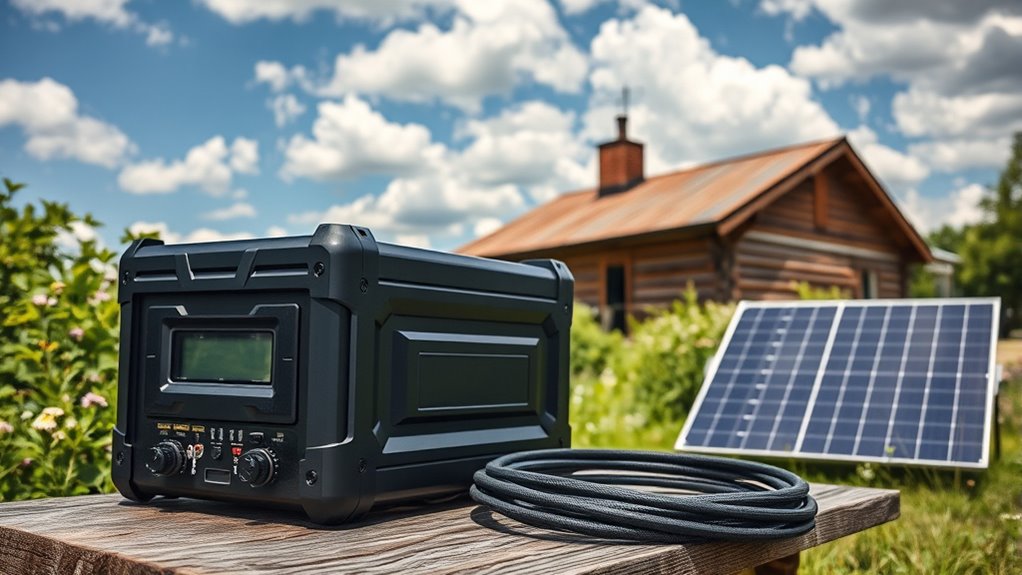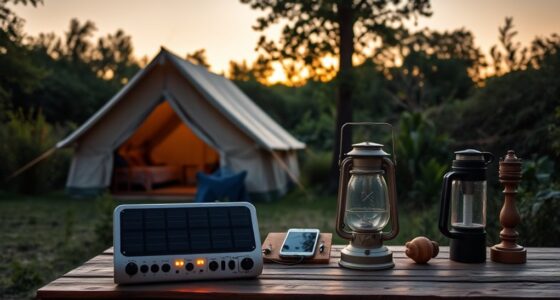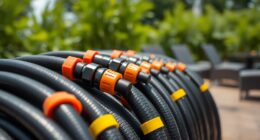If you’re looking for the best battery backups for off-grid living, I recommend options like portable power stations with large capacities and expandability, such as EF ECOFLOW DELTA 2 or Pro, which recharge quickly and support multiple devices. Compact UPS units like CyberPower or Amazon Basics are perfect for essential electronics. When choosing, consider capacity, charging options, and durability to make sure reliable power wherever you go. Keep exploring to see which solutions fit your needs best.
Key Takeaways
- Prioritize high-capacity, expandable power stations like EF DELTA Pro or ALLPOWERS for long-term off-grid energy needs.
- Choose models with fast recharge times and multiple charging options (solar, AC, vehicle) to minimize downtime.
- Opt for durable, long-cycle LiFePO4 batteries for safety, reliability, and extended lifespan in off-grid environments.
- Select versatile units with multiple outlets and device compatibility for powering appliances, electronics, and sensitive gear.
- Consider compact, maintenance-free UPS solutions for emergency backup of essential electronics in remote locations.
EF ECOFLOW Portable Power Station DELTA 2
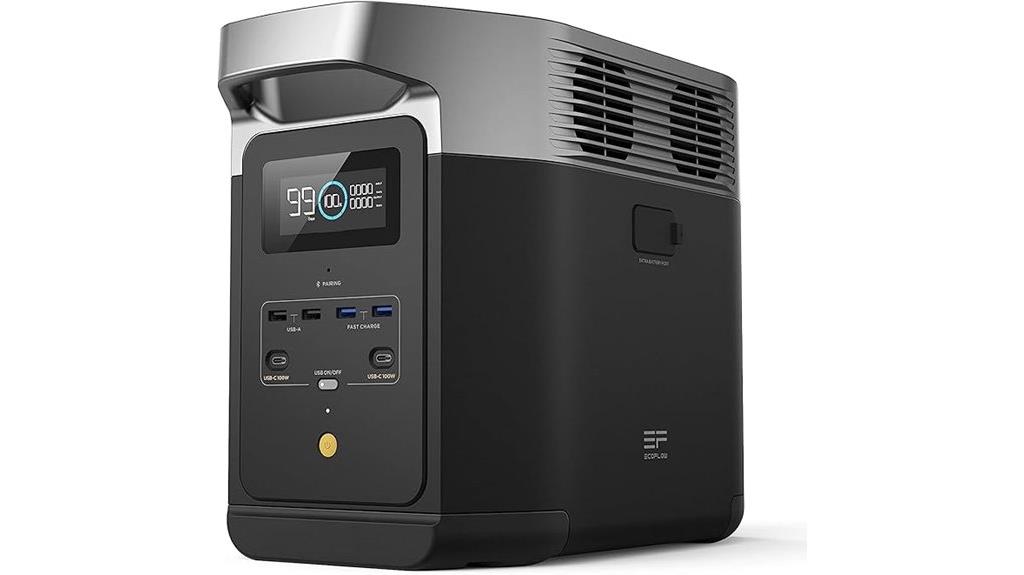
The EF ECOFLOW Portable Power Station DELTA 2 is a top choice for anyone seeking reliable off-grid power, thanks to its impressive 1024Wh LiFePO4 battery and fast-charging capabilities. It can power most household appliances with 1800W AC and 100W USB-C outlets, making it versatile for camping, home backup, or RV trips. Its rapid charging—reaching 80% in just 50 minutes—keeps downtime minimal. Plus, with support for solar input up to 500W, you can recharge sustainably in remote locations. Designed for durability, it offers over 3000 charge cycles, ensuring long-term reliability for all your off-grid adventures.
Best For: outdoor enthusiasts, campers, and homeowners seeking reliable, eco-friendly backup power during off-grid adventures or emergencies.
Pros:
- High-capacity 1024Wh LiFePO4 battery with over 3000 charge cycles for long-term durability
- Rapid charging from 0-80% in just 50 minutes, minimizing downtime
- Supports solar input up to 500W, enabling eco-friendly off-grid recharging
Cons:
- Relatively heavy and bulky for portable use over long distances
- Higher initial cost compared to smaller or less feature-rich portable power stations
- Limited to 1800W AC output, which may not support very high-power appliances
EF ECOFLOW Portable Power Station (DELTA Pro, 3600Wh)
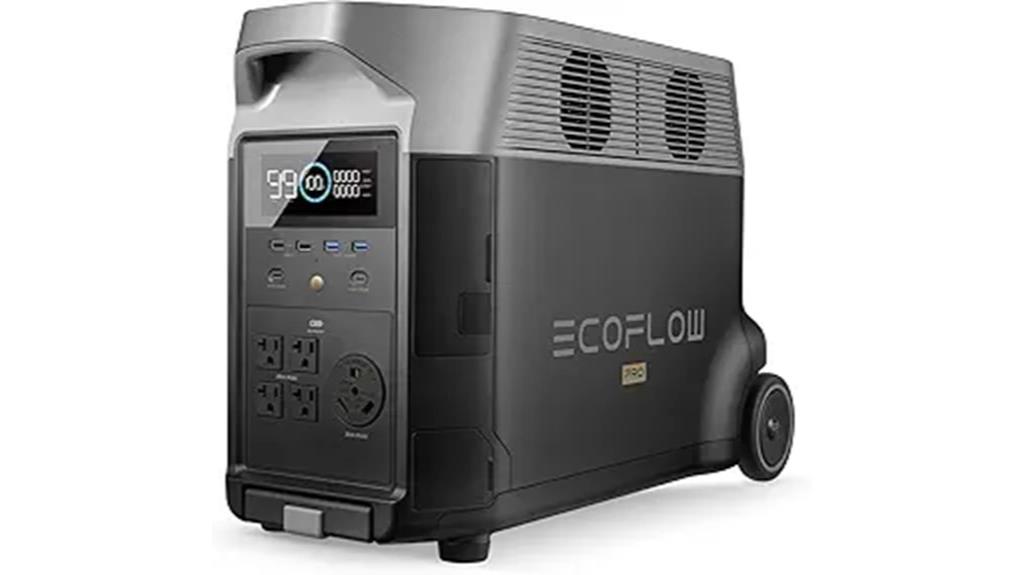
If you’re seeking a powerful, reliable backup for off-grid living, the EF ECOFLOW Portable Power Station (DELTA Pro, 3600Wh) stands out as an excellent choice. Its large 3600Wh LiFePO4 battery can handle home backup, camping, or emergencies, with expandable capacity up to 25kWh. It delivers a maximum output of 4500W, suitable for heavy-duty devices, and features 15 versatile ports for multiple devices simultaneously. Rapidly recharged in under 3 hours via solar, wall, or EV charging, it’s controlled remotely through an app. Its durable design, portability, and expandability make it a top option for reliable off-grid power.
Best For: Individuals seeking a high-capacity, reliable portable power solution for home backup, outdoor adventures, or emergency situations with expandability options.
Pros:
- Large 3600Wh LiFePO4 battery with expandable capacity up to 25kWh for extended use.
- Rapid recharging in under 3 hours via solar, wall, or EV charging, thanks to X-Stream technology.
- Multiple output ports (AC, USB, DC) and remote app control for convenient multi-device operation.
Cons:
- Some users report that DC ports may not deliver rated voltage/current, affecting certain appliances.
- The unit’s weight (99 pounds) can be cumbersome despite built-in wheels and handles.
- Optimal solar panel setup is necessary to achieve maximum efficiency and charging speed.
ALLPOWERS 2500W Portable Power Station with 30A RV Output
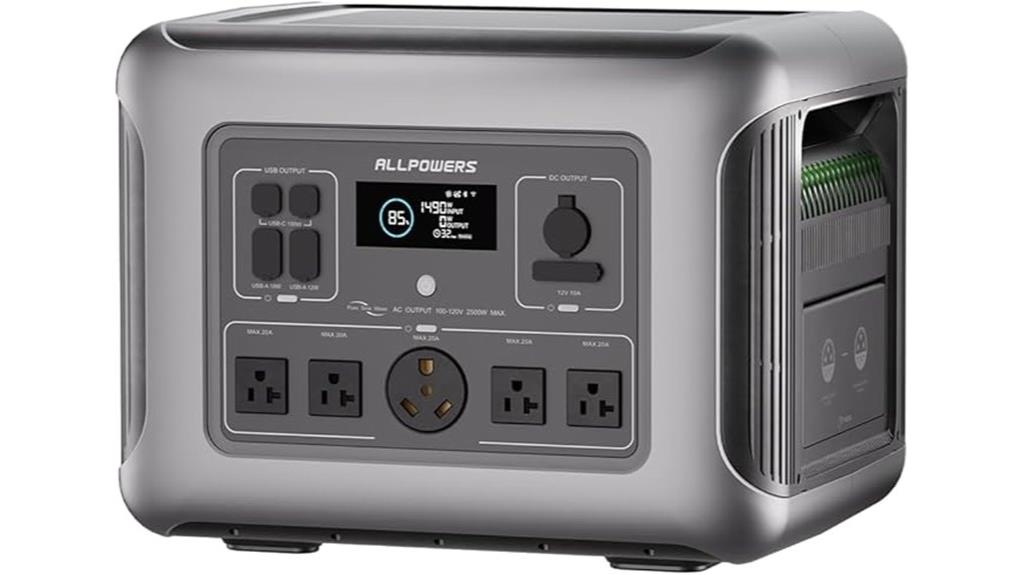
For those seeking a reliable, high-capacity power source to support multiple devices off-grid or during emergencies, the ALLPOWERS 2500W Portable Power Station with 30A RV Output stands out. It delivers 2500W of pure sine wave power, supporting appliances like refrigerators, coffee machines, and electronics simultaneously. With a 2016Wh capacity and versatile outputs—including four AC outlets, an RV outlet, USB-C, USB-A, and a car socket—it’s perfect for camping, RV trips, or home backup. Fast charging options via solar or AC mean you’re always ready to go. Its LiFePO4 battery ensures long life, while the smart control and UPS features provide peace of mind during outages.
Best For: outdoor enthusiasts, RV travelers, and homeowners seeking reliable off-grid power and emergency backup solutions.
Pros:
- High-capacity 2016Wh battery supports multiple devices simultaneously with 2500W pure sine wave output
- Versatile charging options including fast AC and solar recharge, with support for solar panels and external generators
- Long-lasting LiFePO4 battery with over 10 years of use and comprehensive safety features like BMS
Cons:
- Some users may find initial setup of solar panels challenging
- The unit’s size and weight could affect portability for some users
- Price point may be higher compared to smaller or less feature-rich portable power stations
Lithium UPS Battery Backup and Surge Protector (1000VA/800W)
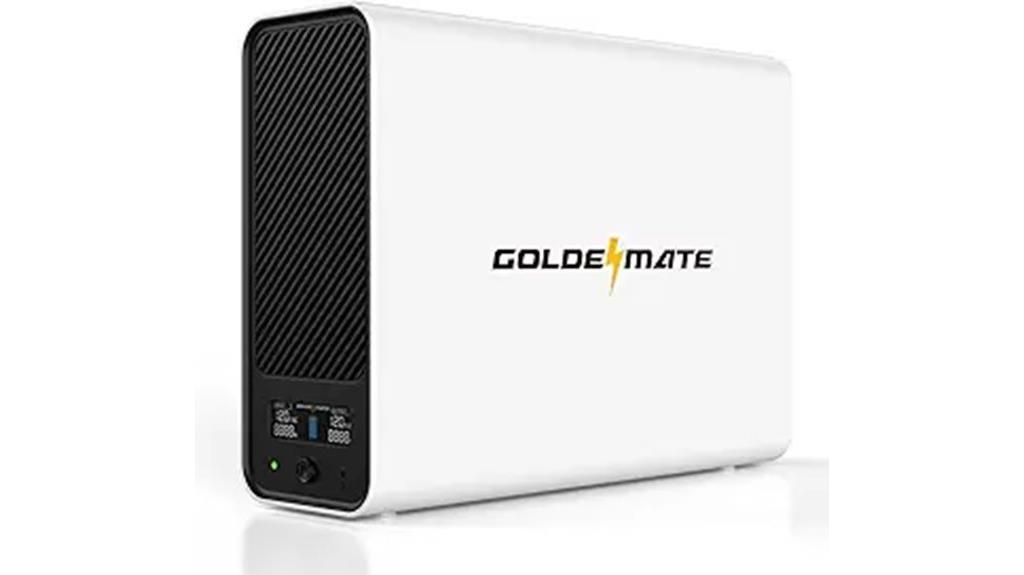
Designed for those who need reliable, long-lasting backup power in off-grid settings, the Lithium UPS Battery Backup and Surge Protector (1000VA/800W) stands out with its advanced Lithium Iron Phosphate batteries. These batteries offer over 10 years of lifespan and more than 5,000 charge cycles, reducing replacement costs by over 40%. With a capacity of around 230 Wh, it supports hours of backup for essential devices. Its pure sine wave output ensures clean power for sensitive electronics, while an intelligent LCD provides real-time system monitoring. Lightweight, durable, and certified for safety, this system offers a dependable, maintenance-free solution for long-term off-grid power needs.
Best For: individuals or small businesses seeking a reliable, long-lasting, and maintenance-free backup power solution for sensitive electronic devices, especially in off-grid or remote settings.
Pros:
- Over 10 years of lifespan and more than 5,000 charge cycles reduce replacement and maintenance costs
- Pure sine wave output provides clean, stable power suitable for sensitive electronics
- Compact, lightweight design with advanced safety features and real-time monitoring via intelligent LCD
Cons:
- Some users may find the absence of USB ports for automatic device shutdown limiting
- Limited runtime at higher loads (approximately 1 hour at 210W) may not suffice for extended outages
- Higher upfront investment compared to traditional lead-acid UPS systems
Portable Power Station 1000W (GRECELL 999Wh Solar Generator)
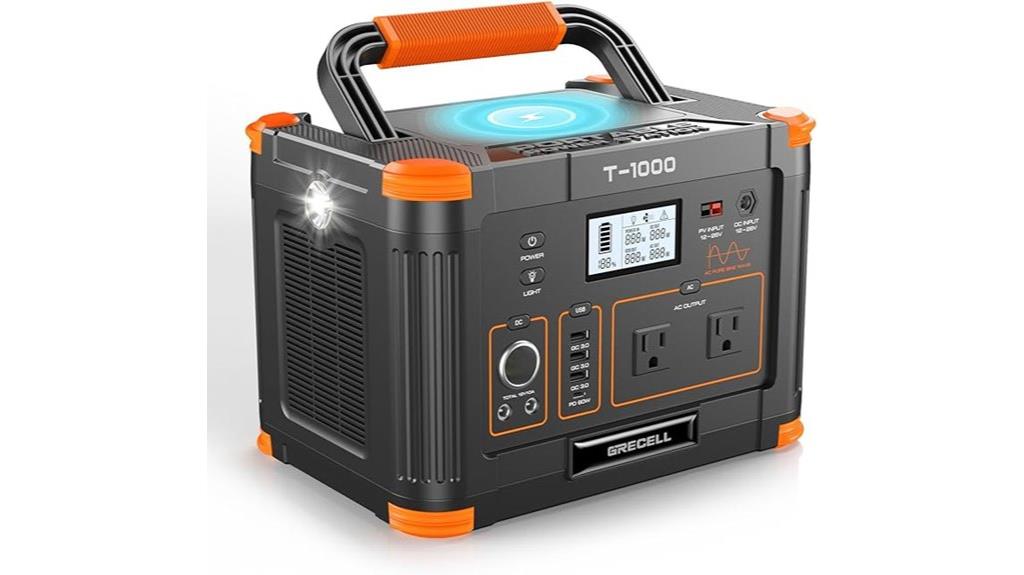
The GRECELL 1000W Solar Generator stands out as an ideal choice for outdoor enthusiasts and emergency preparedness, thanks to its lightweight design and substantial 999Wh capacity. Weighing only 17 pounds, it can power most laptops, phones, lights, fans, medical devices, and small appliances like mini-refrigerators or rice cookers. It supports up to ten devices simultaneously below 1000W and offers versatile charging options: AC, solar, or car. Its built-in MPPT technology maximizes solar efficiency, while multiple output ports, including fast-charging USB-C and wireless charging, make it highly functional. Durable and easy to carry, it’s perfect for camping, RV trips, or backup power during outages.
Best For: outdoor adventurers, emergency preppers, and travelers seeking reliable portable power for multiple devices and off-grid use.
Pros:
- Lightweight and portable at only 17 pounds with sturdy construction for easy transport.
- Multiple charging options including AC, solar, and car outlet, with fast-charging USB-C and wireless charging features.
- Large capacity of 999Wh with the ability to power up to ten devices simultaneously below 1000W, suitable for a wide range of electronics and small appliances.
Cons:
- Limited surge support of 2000W may not handle high-startup power devices.
- Charging times can vary depending on the source and load, potentially requiring longer periods for full recharge.
- Some users may find the device’s size and capacity less suitable for very high-power appliances or extended off-grid use without supplemental power sources.
APC UPS Battery Backup and Surge Protector (BE600M1)
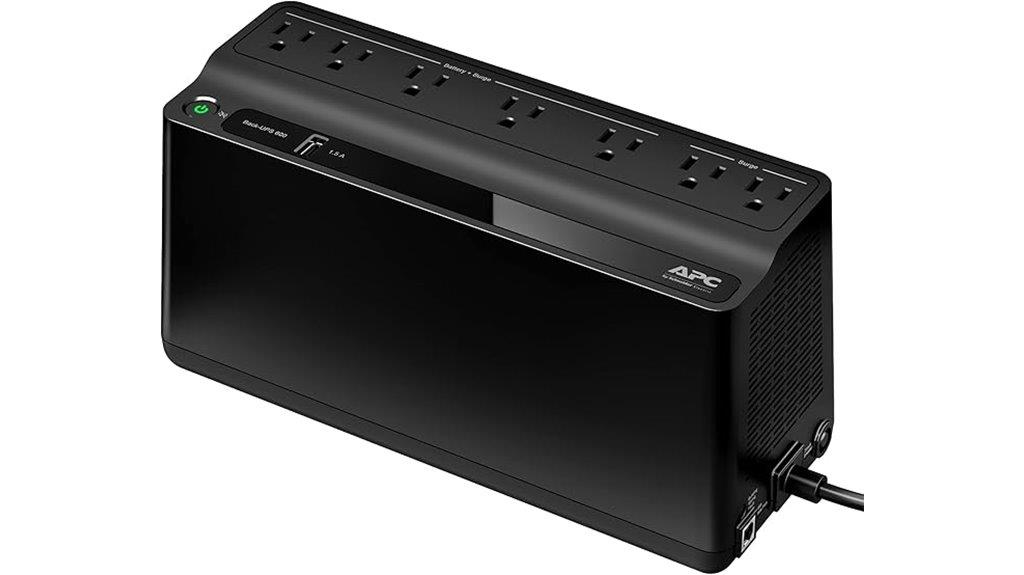
If you’re looking for a compact, reliable backup that protects your essential electronics during power outages, the APC BE600M1 is an excellent choice. It offers 600VA/330W of power with seven outlets—five with battery backup and surge protection, two surge-only. Its 1.5A USB port is perfect for charging small devices. The unit quickly switches to battery without interruption, providing around 16 minutes of runtime at half load. The replaceable battery keeps maintenance simple, and the PowerChute software helps monitor and manage your devices. Overall, it’s a dependable, space-saving solution ideal for computers, routers, and home electronics during outages.
Best For: individuals seeking a compact, reliable UPS solution to protect essential electronics like computers, routers, and home entertainment devices during power outages.
Pros:
- Compact size with wall-mount capability saves space and offers convenient placement.
- Fast switch to battery mode ensures uninterrupted power supply during outages.
- Replaceable battery extends device lifespan and simplifies maintenance.
Cons:
- Limited runtime (~16 minutes at half load) may be insufficient for prolonged outages.
- Battery replacement cost (~$70) can be comparable to purchasing a new unit over time.
- Some users report concerns about build quality and weight compared to older models.
EF ECOFLOW Portable Power Station DELTA 2 Max, 2400W Solar Generator
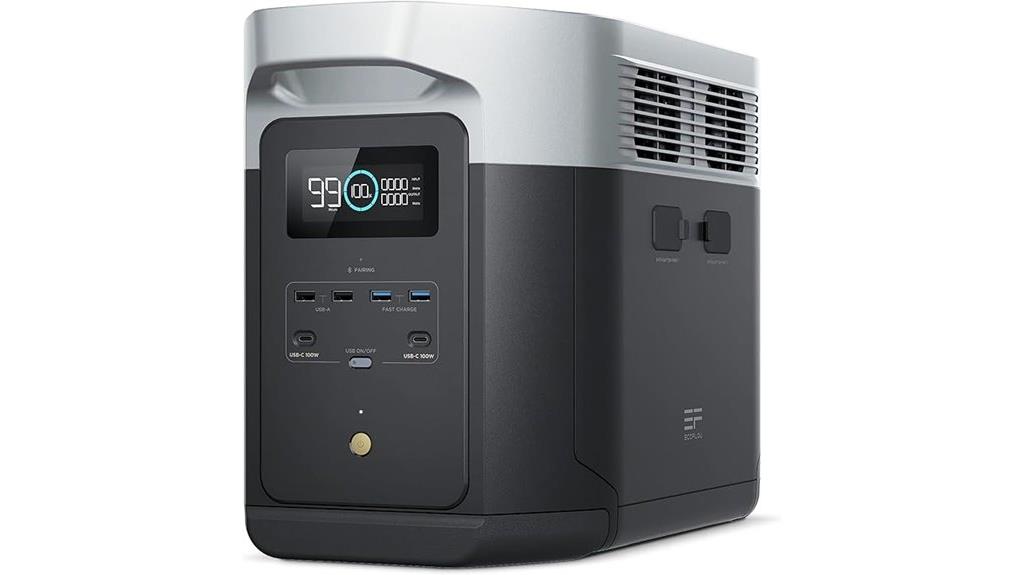
For anyone seeking a reliable, high-capacity power source, the EF ECOFLOW Portable Power Station DELTA 2 Max stands out with its impressive 2400W continuous output and 3,000 charge cycles. It charges rapidly—80% in just 43 minutes with solar or AC, making it flexible for various needs. Its durable Lithium Iron Phosphate (LFP) battery guarantees up to 3,000 cycles and a 10-year lifespan. The modular design allows easy expansion from 2kWh to 6kWh with additional batteries. With 15 outlets and X-Boost support for high-wattage devices, plus quiet operation and smart management via the EcoFlow app, it’s perfect for off-grid living.
Best For: individuals seeking a reliable, high-capacity portable power solution for home backup, outdoor adventures, or off-grid living.
Pros:
- Rapid charging with 80% in just 43 minutes via solar or AC power.
- Long-lasting LFP battery with 3,000 charge cycles and a 10-year lifespan.
- Expandable capacity from 2kWh to 6kWh with modular, plug-and-play design.
Cons:
- Higher initial cost compared to smaller or less feature-rich portable power stations.
- Heavier and bulkier due to high capacity and expandable batteries.
- Limited to 15 outlets, which may be insufficient for very high device demands in some scenarios.
CyberPower EC850LCD Ecologic UPS Battery Backup and Surge Protector
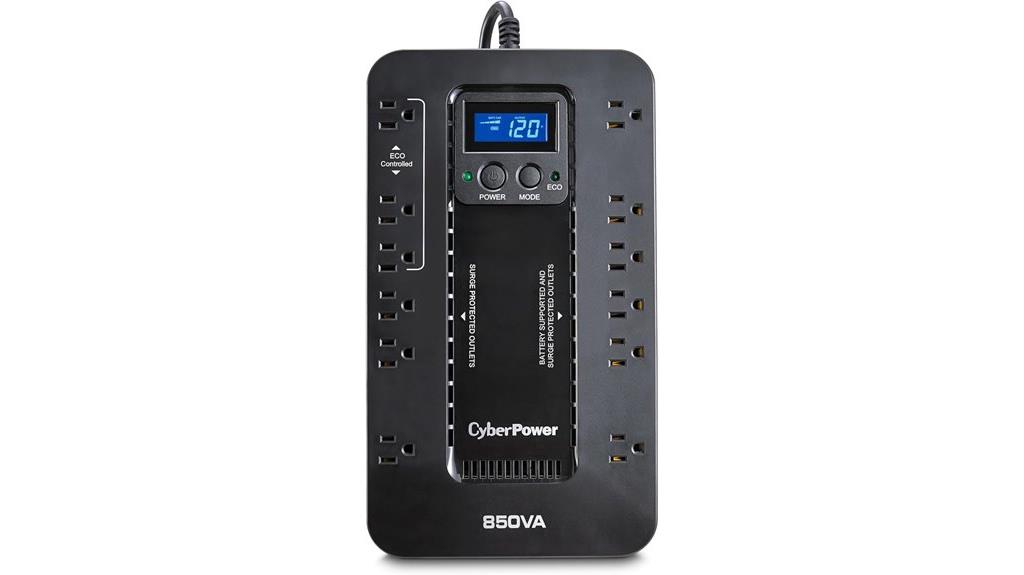
Designed for reliable backup and surge protection, the CyberPower EC850LCD Ecologic UPS is an ideal choice for those seeking energy-efficient power solutions in off-grid or remote setups. It offers 850VA/510W capacity with a compact design, making it suitable for protecting workstations, networking gear, and entertainment systems. The unit features a multifunction LCD that displays real-time status, and its ECO Mode reduces power consumption by disabling peripherals when devices are off or in sleep mode. With 12 outlets—six with battery backup—and a three-year warranty plus free management software, this UPS combines efficiency, convenience, and dependable protection for off-grid living.
Best For: users seeking energy-efficient, reliable backup and surge protection for their workstations, networking equipment, and entertainment systems, especially in off-grid or remote setups.
Pros:
- Eco Mode reduces energy consumption and lowers electricity costs
- Multifunction LCD provides real-time system status and monitoring
- Compact design with 12 outlets offering versatile protection and backup options
Cons:
- Limited to 850VA/510W capacity, which may not support high-power devices
- Only six outlets provide battery backup, potentially requiring additional surge protectors
- No mention of additional features like USB charging ports or modular expansion
APC UPS Battery Backup Surge Protector (BE425M)
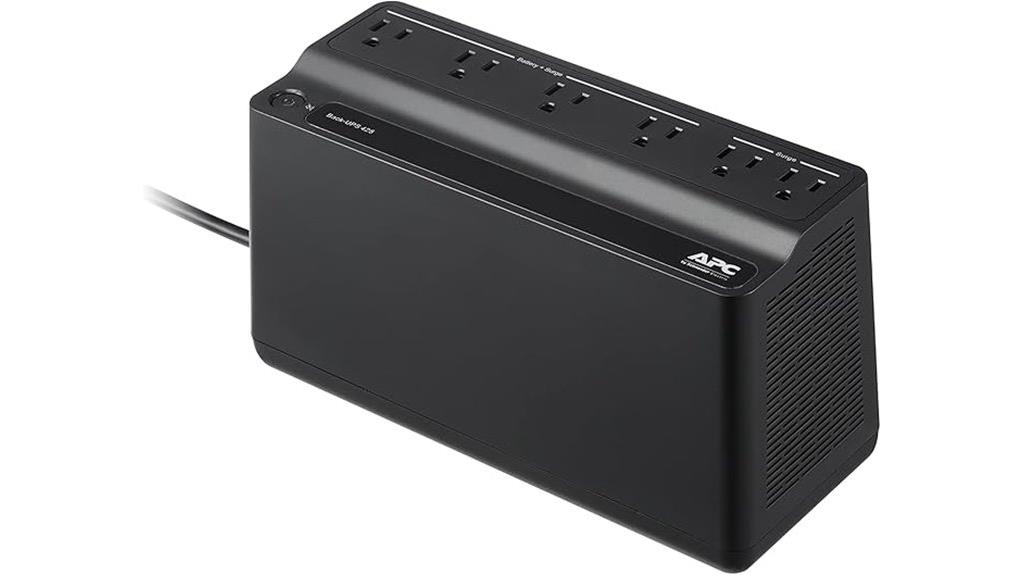
The APC UPS Battery Backup Surge Protector (BE425M) stands out as an ideal choice for those needing reliable power protection for small electronics during outages. With 425VA / 225W capacity, it’s perfect for routers, modems, and media devices. It offers six outlets—four with backup and surge protection, two with surge protection only—and is wall-mountable for convenience. During outages, it provides about 30 minutes of backup power, ensuring your WiFi and essential gadgets stay connected. Rated highly for affordability and durability, it’s simple to set up and maintain. Although not suited for high-power devices, it’s a dependable, cost-effective solution for safeguarding small electronics in off-grid or backup scenarios.
Best For: individuals and small businesses seeking affordable, reliable backup and surge protection for small electronics like routers, modems, and media devices during power outages.
Pros:
- Easy plug-and-play setup with straightforward operation
- Compact, wall-mountable design suitable for tight spaces
- Provides reliable backup power for up to 30 minutes during outages
Cons:
- Not suitable for high-power or gaming computers
- Battery life typically lasts around 5 years before replacement is needed
- Lacks advanced features like auto shutdown for connected devices
APC 1500VA UPS Battery Backup and Surge Protector
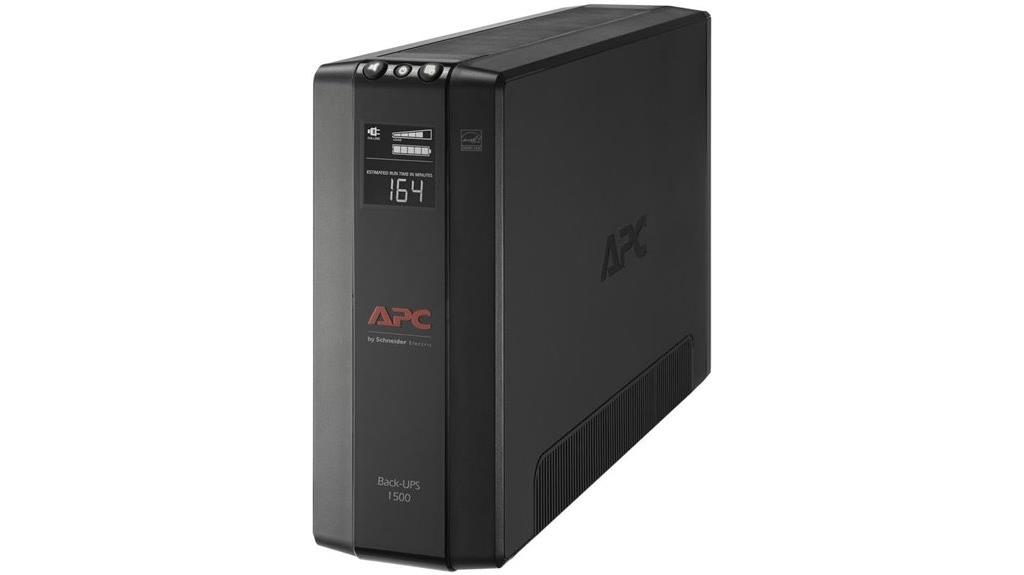
If you need reliable backup power for a home office or entertainment system, the APC 1500VA UPS Battery Backup and Surge Protector stands out as an excellent choice. It offers 1500VA / 900W capacity, supporting high-power devices like gaming PCs, monitors, routers, and home theater gear. With 10 outlets—half with battery backup and half surge protection—it’s perfect for safeguarding multiple electronics. Its Automatic Voltage Regulation (AVR) corrects voltage fluctuations without draining the battery, and it’s compatible with Active PFC power supplies. The user-replaceable battery, energy-efficient design, and real-time monitoring make it a versatile, dependable backup solution for extended outages.
Best For: home office users, gamers, and entertainment enthusiasts seeking reliable backup power and surge protection for multiple high-power devices.
Pros:
- Provides up to 61 minutes of backup at idle, supporting extended outages.
- Equipped with Automatic Voltage Regulation (AVR) to stabilize voltage fluctuations without battery drain.
- User-replaceable battery extends the lifespan and simplifies maintenance.
Cons:
- Heavy weight (around 24 pounds) may require careful handling and placement.
- Occasional false alarms during self-tests or power fluctuations can occur, needing software adjustments.
- Limited to around 20 minutes of runtime under heavy load, which may be insufficient for longer outages.
CyberPower ST425 Standby UPS System, 425VA/260W, 8 Outlets, Compact, Black
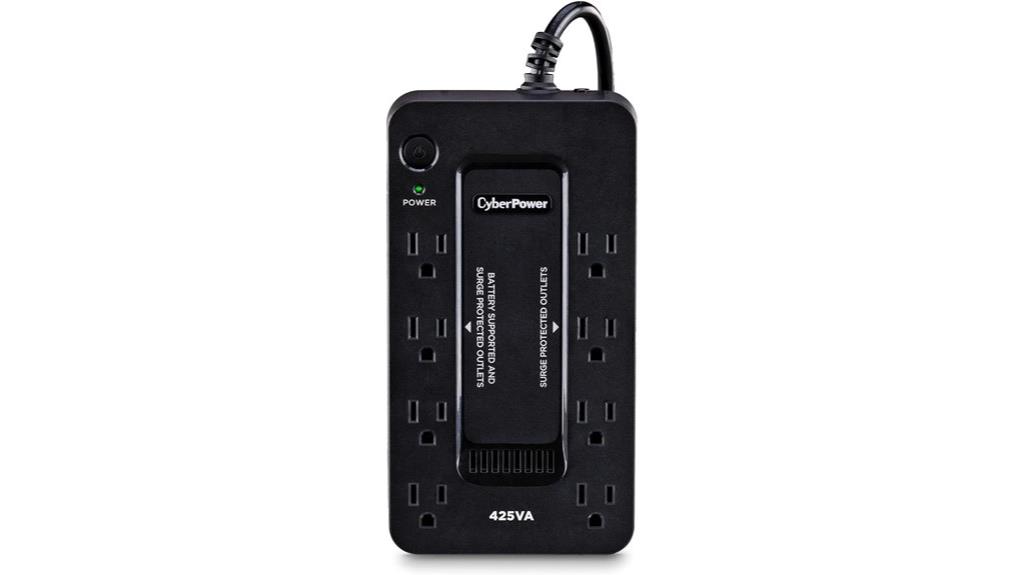
For those seeking a compact and reliable backup power solution for home office or entertainment devices, the CyberPower ST425 Standby UPS System stands out. With 425VA/260W capacity and eight outlets, it protects computers, routers, gaming consoles, and streaming gear. Its small size—just 3.2 by 8.3 inches—fits easily on a desk or shelf, and its black finish blends seamlessly. It provides simulated sine wave output, ensuring safe power during outages, with backup durations of up to 90 minutes for low loads. Quiet and efficient, it effectively handles surges and power fluctuations, making it a dependable choice for safeguarding essential electronics in off-grid or backup scenarios.
Best For: home office and entertainment users seeking a compact, reliable UPS to protect essential electronics from power interruptions and surges.
Pros:
- Compact size and sleek design easily fits on desks or shelves
- Provides up to 90 minutes of backup for low-power devices with simulated sine wave output
- Offers reliable surge protection and quick response to power outages
Cons:
- Non-user-replaceable battery may require costly replacements or professional service over time
- Some users report battery failures after around 38 months, just beyond warranty period
- Limited features compared to higher-end models, with potential challenges in sourcing replacement batteries
CyberPower CP1500PFCLCD UPS Battery Backup and Surge Protector
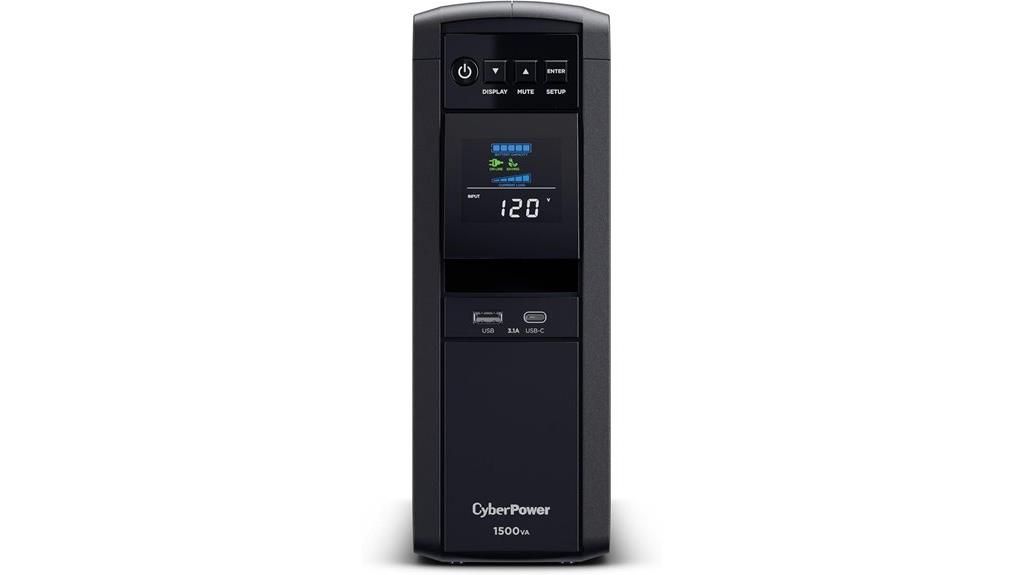
Designed for those who need reliable power protection in off-grid environments, the CyberPower CP1500PFCLCD UPS offers a robust 1500VA/1000W capacity with sinewave output, ensuring critical devices stay powered during outages. It features 12 outlets—six with battery backup and surge protection, six surge-only—plus a five-foot power cord and a right-angle plug for easy setup. The multifunction LCD provides real-time battery and power status, alerting me to issues early. Its automatic voltage regulation prolongs battery life, while the two USB ports keep my devices charged. With a 3-year warranty and a connected equipment guarantee, this mini tower is a reliable, space-efficient solution for off-grid power needs.
Best For: users seeking reliable off-grid power protection for critical devices with sinewave output and space-efficient design.
Pros:
- Provides 1500VA/1000W capacity with sinewave output for stable power delivery
- Features 12 outlets with battery backup and surge protection, plus USB charging ports
- Includes a multifunction LCD display for real-time status and early issue alerts
Cons:
- May be bulkier than basic surge protectors, requiring space for setup
- Limited to five-foot power cord, which might restrict placement options
- The price could be higher compared to simpler surge protectors without battery backup
Amazon Basics UPS Battery Backup & Surge Protector (400VA/255W)
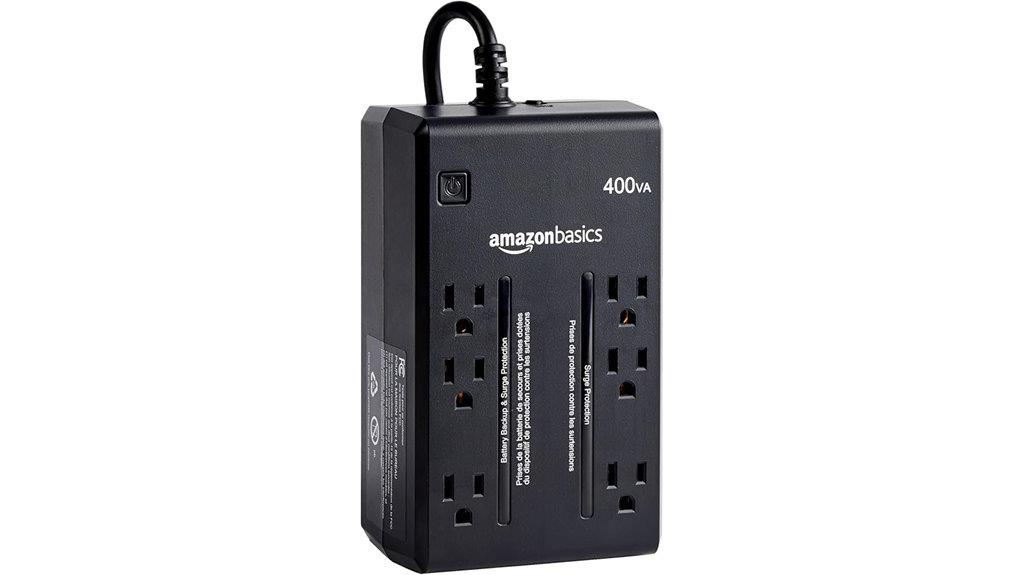
The Amazon Basics UPS Battery Backup & Surge Protector (400VA/255W) stands out as an excellent choice for home users who need reliable short-term power support for their essential devices. It features a standby UPS with six outlets—three surge-protected and three with battery backup—making it ideal for routers, PCs, and monitors. Compact and lightweight, it’s easy to set up and manage, with software for monitoring load and battery life. While it isn’t suitable for heavy appliances, it provides dependable protection during outages, power spikes, and pulses. Many users appreciate its straightforward design, effective surge protection, and solid performance for low-power setups.
Best For: home users seeking reliable short-term backup and surge protection for essential electronics like routers, PCs, and monitors.
Pros:
- Easy to set up with clear battery life display and software support
- Compact, lightweight design ideal for home or small office use
- Effective surge protection and reliable performance during power outages
Cons:
- Limited capacity not suitable for high-power appliances or extended outages
- No official replacement batteries, though compatible alternatives exist
- Some users report difficulties with warranty claims and customer support
Factors to Consider When Choosing Battery Backup for Off‑Grid Living
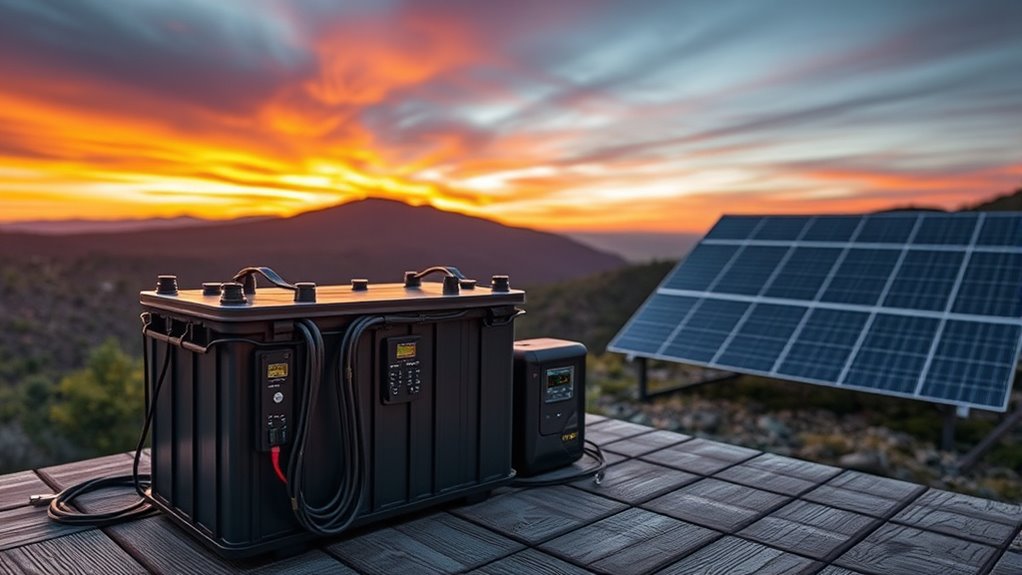
When choosing a battery backup for off-grid living, I focus on several key factors to guarantee it meets my needs. I consider power capacity, battery chemistry, and recharging options to keep everything running smoothly. Additionally, I look at port options, durability, and how long the system will last over time.
Power Capacity Needs
Choosing the right battery capacity depends on accurately evaluating your power needs and how long you want backup power to last. Start by calculating the total wattage of your essential devices to determine the minimum watt-hour (Wh) capacity you’ll need. Consider how many devices you want to run simultaneously and for what duration; larger capacities, like 2000Wh or more, support more devices and extended backup times. Keep in mind that higher capacity batteries tend to be bigger and heavier, so balance your space and portability needs. Also, factor in the battery’s efficiency and depth of discharge, as these influence the usable energy and system longevity. Matching your power demands with the right capacity ensures reliable backup power tailored to your off-grid lifestyle.
Battery Chemistry Types
Selecting the right battery chemistry is crucial for ensuring your off-grid system is reliable, safe, and efficient. Lithium Iron Phosphate (LiFePO4) batteries stand out for their long cycle life, often exceeding 3,000 full charges, making them highly durable. They also provide a stable voltage and are safer, with a lower risk of thermal runaway compared to older lithium chemistries. Lithium-ion batteries typically offer higher energy density but last only 500 to 1,000 cycles, so they may need replacing sooner. Lead-acid options like AGM and gel are more affordable upfront but support fewer cycles—around 500 to 1,000—requiring more frequent replacements. Overall, LiFePO4 batteries are often preferred for their longevity, safety, and lower maintenance needs in off-grid setups.
Recharging Methods Flexibility
A flexible battery backup system must support multiple recharging methods like solar panels, AC outlets, and vehicle chargers to keep power flowing in off-grid environments. Fast charging capabilities, such as reaching 80% in under an hour, are crucial for minimizing downtime and maintaining energy independence. Compatibility with high-wattage solar inputs, up to 500W or more, enables efficient, eco-friendly recharging in remote locations, reducing reliance on grid power. The ability to recharge through different methods simultaneously—like solar and AC—can substantially cut down recharge times during extended off-grid use. Additionally, intelligent management features that optimize input sources, prevent overcharging, and prolong battery lifespan are essential. Flexibility in recharging options ensures continuous power, even in unpredictable or challenging off-grid conditions.
Port and Outlet Options
When evaluating battery backup systems for off-grid living, the variety and arrangement of ports and outlets play a pivotal role in guaranteeing your devices stay powered. I look for enough outlets to support all essential devices simultaneously, including AC, USB, and specialized connections like RV or Anderson ports. The types of outlets matter too—whether USB-C, USB-A, DC, or high-current ports—so I can match my charging needs. I also check the outlet spacing and design, making sure bulky plugs or multiple adapters won’t block adjacent ports. Future expandability is important as well; modular or additional outlets can adapt to changing needs. The goal is a flexible, accessible configuration that guarantees I can connect everything efficiently without hassle or limitations.
Durability and Longevity
Durability and longevity are critical factors when choosing a battery backup for off-grid living because your system needs to withstand constant use and harsh conditions over many years. High-quality chemistries like LiFePO4 are essential, as they offer over 3,000 charge cycles and can last more than a decade. An advanced Battery Management System (BMS) is crucial; it auto-regulates charging, discharging, and temperature, boosting safety and lifespan. The battery’s capacity and cycle count directly impact its durability—more cycles mean better resistance to wear. Proper enclosures and thermal management prevent overheating, which can shorten lifespan. Regular maintenance, such as avoiding deep discharges and monitoring system health, helps ensure your backup remains reliable and efficient for years to come.
Frequently Asked Questions
How Do Battery Backups Handle Extreme Weather Conditions?
When it comes to extreme weather, I’ve found that battery backups with robust insulation and thermal management handle temperature fluctuations better. Cold can reduce their capacity, so I choose models with built-in heaters or better insulation. During heatwaves, I look for units with effective cooling systems. Overall, proper sizing and choosing batteries designed for harsh conditions help me stay powered no matter the weather.
What Is the Lifespan of Typical Off-Grid Battery Backups?
The lifespan of typical off-grid battery backups usually ranges from 5 to 15 years, depending on the type and usage. I’ve found that lithium-ion batteries tend to last longer and retain their capacity better over time compared to lead-acid options. Proper maintenance, avoiding deep discharges, and keeping batteries in a cool, dry place can substantially extend their lifespan. Regular monitoring helps ensure you get the most out of your investment.
Can Battery Backups Be Integrated With Renewable Energy Sources?
Imagine harnessing the sun’s energy and having it seamlessly stored for cloudy days—that’s what integrating battery backups with renewable sources offers. Yes, you can definitely do it! Modern batteries, like lithium-ion, are designed to work with solar panels and wind turbines, creating a reliable, eco-friendly power system. This integration not only keeps your lights on but also reduces dependence on traditional power grids.
How Do Maintenance Requirements Vary Between Different Models?
When it comes to maintenance, I’ve found that different models have varying needs. Some require regular checks of electrolyte levels or software updates, while others need minimal upkeep. I always read the manufacturer’s instructions carefully, as high-capacity or advanced models might need more frequent inspections. Overall, newer lithium-ion batteries tend to be lower maintenance than older lead-acid types, making them easier to keep in good shape over time.
Are There Eco-Friendly or Recyclable Options for Off-Grid Battery Backups?
You’re wondering if eco-friendly or recyclable options exist for off-grid battery backups. I’ve found that many manufacturers now offer batteries made from recycled materials or designed to be more environmentally friendly. Lithium iron phosphate (LiFePO4) batteries, for example, are safer and more sustainable than traditional lead-acid models. I recommend researching brands committed to sustainability, so you can power your off-grid lifestyle responsibly and reduce your environmental impact.
Conclusion
Choosing the right battery backup is like finding the perfect anchor in a storm—your reliable refuge when the grid isn’t an option. With so many options out there, I hope this guide helps you navigate your off-grid journey confidently. Remember, the right power backup keeps your life running smoothly, no matter where you are. Stay powered up, and let your independence shine bright like a lighthouse guiding you home.
